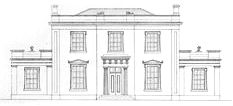Age
Must be younger than 20 (Lizzy’s age) and older than 16 (Lydia’s age) with room for Kitty to also be in that window.
Family and Situation
Mary is the third daughter of Mr. and Mrs. Bennet, making her the sister of Jane, Elizabeth, Kitty, and Lydia. She doesn’t seem to be especially close any of her family members and her parents really favor different daughters.
Mary lives with her family at Longbourn House in Hertfordshire. Through her father’s estate, she will get “one thousand pounds in the four percents, which will not be [hers] till after [her] mother’s decease,” making her prospects pretty meager.
Appearance
The narrator refers to her as “the only plain one in the family.” We know she generally isn’t too engrossed in courtship, balls, etc. which may be because she’s not attractive enough to get attention or because her personality isn’t in that vein.
Character
After her sisters’ marriage “Mary was the only daughter who remained at home; and she was necessarily drawn from the pursuit of accomplishments by Mrs. Bennet's being quite unable to sit alone. Mary was obliged to mix more with the world, but she could still moralize over every morning visit; and as she was no longer mortified by comparisons between her sisters' beauty and her own, it was suspected by her father that she submitted to the change without much reluctance.” All of this suggests that she spends much of her younger years eclipsed by the beauty and vivacity of her sisters.
We’re told that Mary “having, in consequence of being the only plain one in the family, worked hard for knowledge and accomplishments, was always impatient for display. Mary had neither genius nor taste; and though vanity had given her application, it had given her likewise a pedantic air and conceited manner, which would have injured a higher degree of excellence than she had reached.” Much of the comedy of Mary stems from the fact that she thinks better of herself than the world does generally. Mr. Bennet jokingly says to her she’s a lady of deep reflection who reads great books and then laughs at her expense when she can’t come up with anything profound to say. The narrator also tells us that when Jane and Elizabeth return from Netherfield, they find Mary “as usual, deep in the study of thorough-bass and human nature; and had some extracts to admire, and some new observations of threadbare morality to listen to”.
Mary also seems to think herself as more erudite than pedantic Mr. Collins. She critiques the literary merits of his letter to Mr. Bennet and we’re told “She rated his abilities much higher than any of the others; there was a solidity in his reflections which often struck her, and though by no means so clever as herself, she thought that if encouraged to read and improve himself by such an example as hers, he might become a very agreeable companion.” Mr. Collins, evidently, doesn’t find her attractive or interesting enough as he never offers for her.
Habits and Hobbies
Everyone does seem to agree that Mary works very hard to be an accomplished woman. She is tickled to learn that someone at the Meryton Assembly told Mr. Bingley she was the most accomplished girl in the neighborhood. This can sometimes be at the expense of others, however; Jane (who never thinks ill of anyone) explains away her lack of assistance with their hysterical mother by emphasizing how busy Mary always is in her studies.
